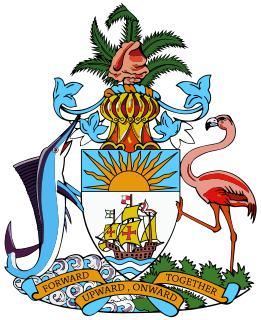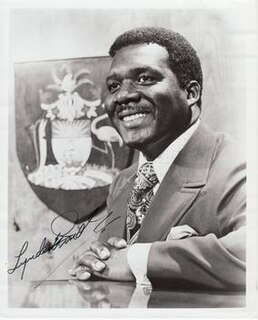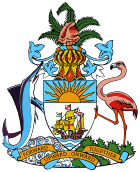
The Bahamas is a parliamentary constitutional monarchy headed by Queen Elizabeth II in her role as Queen of the Bahamas. The politics of the Bahamas takes place within a framework of parliamentary democracy, with a Prime Minister as the head of government. The Bahamas is an independent country and a member of the Commonwealth of Nations. As a former British colony, its political and legal traditions closely follow those of the United Kingdom. Queen Elizabeth II is the head of state, but executive power is exercised by the cabinet. Legislative power is vested in the two chambers of parliament. The Judiciary is independent of the executive and the legislature and jurisprudence is based on English common law. The multi-party system is dominated by the Progressive Liberal Party and the Free National Movement. The constitution protects freedom of speech, press, worship, movement, and association.

The Right Excellent Sir Lynden Oscar Pindling, is regarded as the "Father of the Nation" of the Bahamas, having led it to majority rule on 10 January 1967 and to independence on 10 July 1973. He served as the first black premier of the Colony of the Bahama Islands from 1967 to 1969 and as Prime Minister of the Bahamas from 1969 to 1992. He was leader of the Progressive Liberal Party (PLP) from 1956 to 1997 when he resigned from public life under scandal.

Perry Gladstone Christie, PC, MP, is a Bahamian former politician who served as Prime Minister of the Bahamas from 2002 to 2007 and from 2012 to 2017. He is the longest-serving Bahamian elected parliamentarian, representing the Centreville constituency from 1977 to 2017. He is also a former athlete. His Progressive Liberal Party is the oldest Bahamian political party, holding solid majorities in the Bahamian Parliament several times in its long history.

Elections in the Bahamas take place in the framework of a parliamentary democracy. Since independence voter turnout has been generally high in national elections, with a low of 87.9% in 1987 and a high of 98.5% in 1997. The current Prime Minister is the Hon Hubert Minnis.

Brent Symonette is a Bahamian businessman and Minister of Financial Services, Trade and Industry and immigration. He was sworn in on May 15, 2017. He served as Deputy Prime Minister and Minister of Foreign Affairs of the Bahamas from 2007 to 2012. He also served as Member of Parliament for the St. Anne's constituency. He is a member of the Free National Movement (FNM).

General elections were held in the Bahamas on 2 May 2007.
Orville Alton Thompson "Tommy" Turnquest is a Bahamian politician.

A general election was held in the Bahamas on 7 May 2012. Elections in the Bahamas take place in the framework of a parliamentary democracy, which relies on the first past the post system of voting. This was the first general election in which a third party offered a full slate of candidates along with the two major parties. The opposition Progressive Liberal Party (PLP) won a majority in the election making Perry Christie prime minister.

The Democratic National Alliance is one of the three main political parties in The Bahamas, formed in May 2011. The interim leader of the DNA is Christopher Mortimer, succeeding the party's first leader and original founder Branville McCartney who resigned following the events of the Bahamian general election, 2017.{Arnithia Komolafe}·° was elected as the party's deputy leader shortly after Mortimer's appointment
William "Bill" Cartwright was a Bahamian politician, realtor and magazine publisher. Cartwright, together with Sir Henry Milton Taylor and Cyril Stevenson, co-founded the Progressive Liberal Party (PLP) in 1953, the first national political party to be established in the Bahamas. He was the last surviving member of the PLP's three founders.

Dr. Hubert Alexander Minnis is the Bahamian Prime Minister since May 2017. Minnis is the leader of the Free National Movement, the present governing party, and the Member of Parliament for the New Providence constituency of Killarney. First elected to the legislature in the 2007 election, he succeeded Hubert Ingraham as party leader following the party's defeat in the 2012 election.

The Prime Minister of The Bahamas is the head of government of the Bahamas, currently Hubert Minnis. Minnis, as leader of the governing Free National Movement party (FNM), He was sworn in as Prime Minister on 11 May 2017, succeeding Progressive Liberal Party (PLP) leader Perry Christie. This was a result of the FNM's victory in the Bahamas general election of May 10, 2017. The Prime Minister is formally appointed into office by the Governor General of the Bahamas, who represents Elizabeth II, the Queen of the Bahamas.
Hon. Sir Clement T. Maynard,, was a former Deputy Prime Minister of The Bahamas (1985–92), who was also deputy leader of the Progressive Liberal Party (PLP). His long and distinguished career in Bahamian public life encompassed being a trade unionist, a Senator and then Member of Parliament. Widely regarded as “ one of the fathers of the modern Bahamas”, Maynard was the only person apart from Sir Lynden Pindling to have been appointed to serve in every Bahamian cabinet from 18 January 1967 to 18 August 1992. He served in a number of ministerial capacities, including as Minister of Works, Minister of Labour and Home Affairs, Minister of Health, Minister for Public Personnel, Minister of Foreign Affairs, and most notably Minister of Tourism, a post he held continuously for a decade, making him the longest-serving Minister of Tourism.
Loretta Butler-Turner is a Bahamian mortician and politician for the Free National Movement (FNM) and was the Leader Of Her Majesty's Loyal Opposition in the Bahamian Parliament from December 2016 to May 2017. She was the first female in The Bahamas to earn a Bachelor of Science degree in mortuary sciences and became the first female embalmer and mortuary director in the country. In 2016 she became the first female to be appointed Leader of Opposition in the Bahamas. In 2007, she was elected as a Member of Parliament, serving initially for the Montagu Constituency and in 2012 was elected for the Long Island Constituency. She also served as Vice President of the Inter-American Commission of Women from 2009 to 2011.

General elections were held in the Bahamas on 10 May 2017. The elected members of the House of Assembly then elected the Prime Minister.
Sir Arlington Griffith Butler was a Bahamian teacher, lawyer, and politician.
Arinthia Santina Komolafe is a Bahamian politician who was elected the Deputy Leader of the Democratic National Alliance (DNA), one of the three main political parties in the Commonwealth of The Bahamas on the 24th October, 2017. She succeeded Christopher Mortimer who was appointed as the Interim Leader of the DNA on the 24th October, 2017. Mortimer was appointed Interim Leader following the DNA's defeat in the Bahamas' General Elections on 10 May 2017 when the Party failed to win a parliamentary seat of the 39 possible parliamentary seats in the House of Assembly. Founder and inaugural leader of the DNA, Branville McCartney announced his intention to resign from the Party and front line politics following the defeat. Komolafe is the first female to hold a top leadership post in the DNA and the third in The Bahamas among the three main parties, following Cynthia Pratt, former Deputy Leader of the Progressive Liberal Party (PLP) and Loretta Butler-Turner, former Deputy Leader of the Free National Movement.










